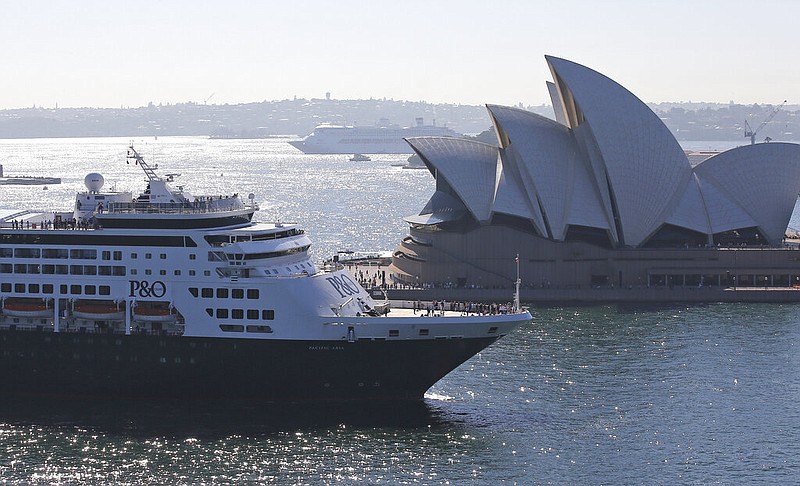Australia's two-year-long ban on cruise ships expired on Sunday, another step toward the rehabilitation of tourism from the damage wrought by the pandemic.
The ban on foreign cruise ships -- imposed in March 2020 after a covid-19 outbreak aboard the Ruby Princess spilled into Sydney once the vessel docked -- cost the Australian economy more than $7.4 billion, the Cruise Lines International Association estimates.
Operators "are preparing for a carefully managed resumption of operations in a sector that previously supported more than 18,000 Australian jobs," the association said in a statement ahead of the ban's expiration.
Australia's states will determine when vessels can enter now the federal ban has run out. Safety steps include vaccination requirements for crew and passengers over 12 years old, as well as mask and covid-19-testing protocols.
P&O Cruises Australia's Pacific Explorer was set to be among the first ships to dock in Sydney Harbor today ahead of a return to service at the end of May.
Before covid-19, 1.6 million cruise passengers visited Sydney in 2017 and 2018, according to official figures. The pandemic hit cruise ships particularly hard after high-profile outbreaks that led a variety of ports to block access.
Tourism industry bodies say there's significant pent-up demand for cruises but it remains unclear whether the fear of the disease will permanently affect the sector. Travel shares globally have yet to recover the ground lost because of the pandemic and have trailed global equities significantly since the start of 2020.
HAITI, JAMAICA EASE UP
Across the world, Haiti and Jamaica are joining a growing list of countries that are once again revising their covid-19 travel protocols in hopes of making it easier for visitors, and to boost revenue and vaccination rates.
Effective Saturday, international visitors to Jamaica were no longer required to present a negative result from a covid-19 antigen or PCR test taken within 72 hours before landing, the Jamaica Tourism Board announced.
Additionally, as of Friday Jamaica has ended its mandate for masks in enclosed public spaces.
Jamaica Tourism Minister Edmund Bartlett said both decisions are "important strides" toward his nation's continued gradual relaxation of travel protocols as the spread of covid-19 keeps declining.
Jamaica recently eliminated travel-related quarantines and the requirement for travelers to complete and receive approval of a Travel Authorization Form for entry to the island. It also shortened the isolation period required for U.S. travelers who test positive for covid-19 while in Jamaica, in keeping with CDC recommended guidelines, and eliminated quarantine restrictions for fully vaccinated business travelers who present a negative PCR test taken within 3 days of travel to Jamaica.
Recently, the U.S. Centers for Disease Control and Prevention downgraded Jamaica to a Level 1 designation, the lowest, in its latest covid-19 travel advisory because of the country's low number of cases. Jamaica's case levels have steadily decreased in recent months after the country struggled with controlling infections during the pandemic.
"We are optimistic that these simpler requirements will serve to increase the appeal of Jamaica as a premiere destination and keep us moving along the road to a stronger recovery for both the tourism sector and the nation's economy as a whole," Bartlett said.
Haiti is putting new covid-19 requirements in place as of today. Fully vaccinated visitors will no longer need to present a negative covid-19 antigen or PCR test taken within 72 hours of travel. But the testing requirement will stay in place for unvaccinated visitors, the health ministry has announced.
The last country in the Caribbean and Latin American to receive covid-19 vaccines, Haiti has the lowest vaccination rate in the region, with 1.1% of its population vaccinated. By making it easier for vaccinated persons to visit, ministry officials are hoping to see an increase in Haitians willing to get vaccinated.
The ministry has reported 30,586 infections and 835 coronavirus-related deaths since the pandemic began. While health experts agree the figures are undercounted, they also agree that the virus has not been as deadly in Haiti as it has been elsewhere. The CDC in recent weeks dropped the country from its "avoid travel" "Level 4" health list and reclassified it under "Level 1." Haiti remains at "Level 4" on the State Department's travel advisory because of "kidnapping, crime and civil unrest."
The requirement for travelers coming to the U.S., including returning citizens and residents, to get tested within one day of flying remains unchanged, per the CDC guidelines.
Earlier this month, the World Health Organization's Americas office warned that while cases are trending down in most countries across the region, some countries in the Caribbean and Latin America are seeing a spike in infections amid the relaxing of public health protocols.
Information for this article was contributed by Sunil Jagtiani of Bloomberg News (TNS) and Jacqueline Charles of the Miami Herald (TNS).

